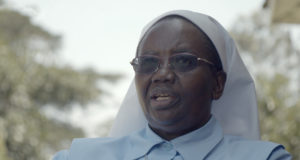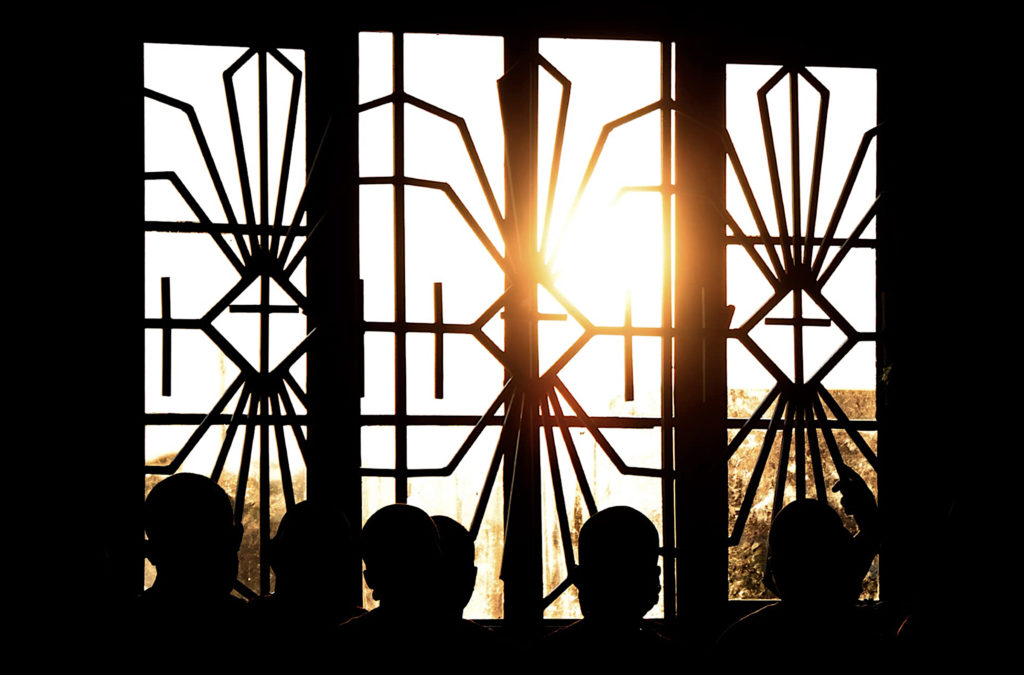“You will always return. Like falling in love. You’ll never be the same.” These are the words Father Joseph Ssergo, chaplain of Pope John Paul II High School in Uganda, uses to describe his community.
After watching “Rescued From Darkness,” it is easy to see what he means.
Awarded “Best Documentary” at the Odyssey Fest and IMAFA film festivals, the 78-minute film from Personally Catholic tells the story of a school born out of the ashes of war.
Since gaining its independence in 1962, Uganda has hardly known peace. After decades of military coups, dictatorship, and violence — including child sacrifice practiced by tribal cultures — the prospect of education seemed impossible for many Ugandan families.
But in 2009, the Apostles of Jesus missionaries and the nonprofit organization Building a Bridge to Uganda set out to build a school — in the middle of the jungle and a former war zone.
Fourteen years later, the film captures 700 students in bright yellow uniforms filling a vast campus of neat, red-roofed buildings. The academic results are just as impressive: JPII School consistently scores in the top 5% of national testing, and 98% of graduates go on to higher education, a rarity in Uganda.
But as the film unfolds, it is the overwhelming joy — not the academic achievement — that is the distinguishing feature of the school.
Almost every shot features wide smiles, laughter, and singing, almost as if the faculty and students are untouched by the brutal past.
Yet that is not their reality — many interviewees recall fleeing for their lives, sleeping in bushes, and escaping child sacrifice.
The film brings these chilling memories to life through dramatized reenactments: figures race through the jungle amid the sound of gunshots or breathlessly hide in roof rafters while gunmen pace below.
But at JPII School, where fear and death once reigned, music and learning have taken root.

So what is the secret? Unlike other educational reform projects, no one points to a special teaching method, a complex curriculum, or high-tech school supplies. In one interview after another, the audience hears the same response — it’s the centrality of faith that makes the difference.
“Right away, from day one … we put God first,” says Kukundakwe Christine, one of the original JPII School faculty members.
Prayer paved the way for this seemingly impossible project, and prayer remains the beating heart of the school. Each day, all faculty and students gather for morning Mass and evening prayers. At the center of the campus stands a chapel, marking the school’s physical and spiritual heart.
The effect is visible. The students speak about the happiness and peace that floods their lives. In spite of their horrific past, they look to the future with hope. They dream of being teachers, priests, and religious sisters, eager to pass on the faith they have received.
“A student of Pope John Paul knows that with God, everything is possible, and you can’t do without him,” one teacher states.
It’s not that faith has eliminated all troubles. As one student notes, “Many of the social, material, and financial scars remain, even after all these years.”
And yet these challenges neither overshadow the goals nor slow the momentum at JPII School. Poor as they are, the students donate shoes to even poorer communities. And in a country where jobs are few and far between for college graduates, alumni return to teach, eager to assist even as volunteers.
To a Western culture that touts academic achievement and career opportunity as the markers of educational success, the primacy of faith at JPII School offers a radical alternative. The documentary could have led with the school’s standout scores and graduation rates, but it only mentions these statistics at the very end.
While upholding their academic mission, the school’s founders, administration, and teachers see it as secondary to their spiritual mission. More than just minds to be instructed, they see their students as souls to be guided to heaven. Religious identity is more than a peripheral feature. It is the driving force behind every action, the source of every kind of success.
And as “Rescued From Darkness” makes clear, by putting God first, everything else falls into place.
One can’t help but wonder how our culture would change if every Catholic school in America lived its supernatural mission with the same fervor. If Ssergo is right, we’d never be the same.
“Rescued from Darkness” is available to stream on Amazon Prime and Apple TV.

